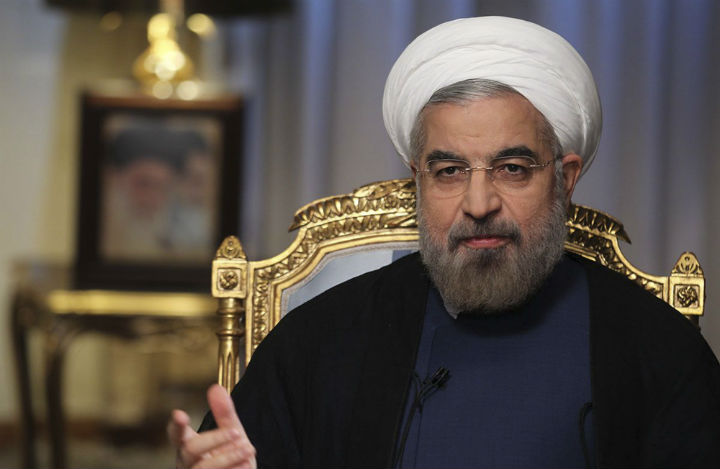ABOVE: Iranian President Hassan Rouhani spoke in an U.S. television interview and the tone he struck has many wondering if Iran may be ready for a new relationship with the U.S. Eric Sorensen reports.

If it wasn’t enough to go on U.S. television this week to show Iran has a new take on foreign relations, President Hassan Rouhani has taken to the pages of a major newspaper in the U.S. to extend another olive branch to the West.
In a Washington Post opinion piece titled “Why Iran seeks constructive engagement,” Rouhani discussed his country’s nuclear ambitions, dealing with the Syrian crisis and how he plans to approach foreign policy.
“We must work together to end the unhealthy rivalries and interferences that fuel violence and drive us apart,” said Rouhani, who was elected in June with 50.7 per cent of the vote. “We must also pay attention to the issue of identity as a key driver of tension in, and beyond, the Middle East.”
Rouhani was considered a reformer amid the field of candidates and, on the surface, appears markedly more moderate than his hardliner predecessor Mahmoud Ahmadinejad.
In the lead-up to his first appearance before the United Nations General Assembly next week, Rouhani’s statements seem to be an attempt to warm relations with U.S. President Barack Obama.
In an annotated version of the op-ed piece, Washington Post blogger Max Fisher interpreted Rouhani’s words as such:
Rouhani: “The world has changed. International politics is no longer a zero-sum game but a multi-dimensional arena where cooperation and competition often occur simultaneously. Gone is the age of blood feuds. World leaders are expected to lead in turning threats into opportunities.”
Translation: Let’s not pretend we’re about to become best friends overnight. The United States and Iran disagree on plenty. But Iran’s decades of anti-Western resistance aren’t working for us anymore, and you in the United States seem to have come around to coexisting with the Islamic Republic instead of toppling it.
White House press secretary Jay Carney hinted Thursday a meeting between the two presidents is a possibility.
“It’s possible, but it has always been possible… The extended hand has been there from the moment the president was sworn in,” Reuters reported Carney saying.
Carney said Obama did not have any plans to meet with Rouhani at the General Assembly, but the two leaders will speak within hours of each other on Tuesday.
Rouhani noted in his interview with NBC‘s Anne Curry, which aired on Thursday, Obama sent him a letter following his inauguration last month. Rouhani said the letter was “positive and constructive.”
An exchange of letters is one thing — Rouhani sent one back — but meeting one another face-to-face would be something monumental.
“More than any words he might say, Rouhani’s greatest gesture would be shaking hands with President Obama,” The Atlantic quoted Carnegie Endowment for International Peace analyst Karim Sadjadpour saying. “It would be one of the most significant geopolitical handshakes in years.”
READ MORE: A tale of two Irans: Khamenei, Rouhani take different stances on Syria
No U.S. president has met with an Iranian counterpart since 1979, the year of the Islamic Revolution and the U.S. hostage crisis.
A key figure in the hostage crisis, former Canadian ambassador Ken Taylor, thinks there is good reason to be optimistic about the new president.
Taylor called Rouhani, a “remarkable man” who is both familiar with the West and has the trust of his country’s top Islamic clerics, The Canadian Press reported.
“At this moment – I think without sounding too naive or forgetting about the Iranian performance up to now – we could be on the brink of a breakthrough,” the former diplomat told the Global Business Forum in Banff, Alta., Friday.
“This is somebody who appears to have the mandate of the supreme leader. He knows the West, just as well as the rest of us.”
Scotland-educated Rouhani has sent good wishes to Israel, whereas his predecessor, Mahmoud Ahmadinejad, “just threatened to send a bomb,” Taylor said. Taylor said there’s a “lack of mutual trust” when it comes to talks between Iran and Western nations, but he says he hopes new negotiations won’t be held back by past failures.
Canada’s Foreign Affairs has no immediate plans to extend a hand just yet to Rouhani just yet.
Foreign Affairs Minister John Baird expressed skepticism about Rouhani, when he was inaugurated last month.
“We will judge the Government of Iran on their actions… not on a public relations exercise,” Baird said on Thursday.
He said the Canadian government wants to see progress on nuclear negotiations, then a positive change in the country’s human rights situation and end to Iran’s support of the Lebanese militant group Hezbollah.
Baird’s spokesperson Rick Roth said Friday the minister has no immediate plans to meet with his Iranian counterpart.
*With files from Lauren Krugel of The Canadian Press



Comments